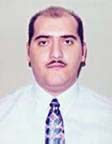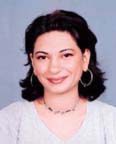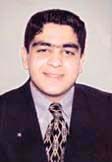|
Autumn 1998 (6.3) Baku Diary usually describes the experiences of foreigners who are living in Baku. In this issue, we "turn the tables" and give young Azerbaijanis a chance to reflect about what it's like to come home to Baku after studying abroad. Here's what they had to say. For most of them, now, as they begin to take on the responsibilities of adulthood, the difficult economic situation weighs heavily. Click on one of the following names to go straight to that section of the article. Azada
Nuruzade
A few years from now, they will grow up, take off their "extra" earrings, replace their shorts and caps with suits and ties, and it will probably be hard to separate them from the crowd - at least from appearance. But their mentality will still be different, and that difference will remain forever. I'm proud to say that I'm one such Azerbaijani. Before the FSA program, I had never traveled much. Most of my life had been spent in my home city of Baku. The only access I had to information about the U.S. was via TV and a few American history books. But neither books nor TV can express the feeling that I had living in a community of people who had completely different culture, traditions, thoughts and values than mine. I found America to be a place where people sometimes acted so strange that I thought they were crazy. It seemed everything was so different from back home. But I had no choice - either I had to adapt or quit the program and return home. I'm glad I stayed. One of the most important things I learned during my study abroad was that everything going on around me is not necessarily good or bad; people cannot be categorized as completely right or completely wrong. Things can just be different, and people can just think differently. I learned to respect ideas or arguments that were different from my own. I learned to be more open-minded. In America, I saw that independence was not just a quality of the nation as a whole, it was characteristic of every individual. At first, I was surprised to see parents teaching their children from a very young age not to look for solutions from anyone else other than themselves. I see now that independent thinking is essential in helping young people grow up to succeed in their lives and achieve their goals. To them, and now to me, the definition of independence has come to mean being strong in spirit and character as an individual. Another thing that impressed me was "American optimism." It was so contagious that when I returned to Baku, my parents even noticed that I had caught it. I no longer call the glass "half-empty" - it's always "half-full." Some people think that the influence of another culture can only bring harm to Azerbaijan, but I'm sure, and hope that you will agree with me, that programs like the FSA exchange help our young nation to bring up strong and independent people who will serve Azerbaijan as great leaders. Jamal Ismayilov,
18
Since childhood I had always dreamed of seeing London - this city with its majestic architecture, lush parks and gardens, its medieval history - this city of umbrellas. I knew from books and TV that it was one of the most beautiful cities in the world, so I was very excited when I had the chance to study English there a few months this past spring. I'll never forget Leicester Square where wonderful musicians mesmerized their audiences well into the early morning hours. Or Speaker's Corner where everyone can express their ideas and problems. I loved this country where rules and the law are the basis upon which everything else is built. I studied in Manchester, the home of my favorite musical group - the Bee Gees. There were many foreigners there but few of them knew anything about Azerbaijan. In fact, I was the first Azeri that any of them had ever met. Now I have friends from Japan, Oman, Germany, Italy, Brazil, Austria, China and, of course, the UK. They all say they want to visit Azerbaijan. Curiously, when I began to compare the educational level of our people, I began to realize that our Soviet educational system was not so much inferior to that of other countries, and in many cases, it seems it was much better. But while I was in the UK, I gained a great respect for the educational system there. How I wish we had a library system like theirs. As far as their public transportation and health care services are concerned, we can only dream of such an efficient infrastructure. It's impossible to imagine that country without its double decker buses, its incredibly tolerant and patient bus drivers, the red public telephone booths and, of course, British tea. At first I didn't much like their tea, traditionally served with milk and sugar. Now I miss it. I love my country and my nation. I love my language. I love Baku. Ours is an old civilization with an incredible history that dates back thousands of years as evidenced by archeological findings at Gobustan [See AI 6.2] and the Azikh Caves [See AI 4.2]. Right now, we see a lot of new construction going on in Baku-it's wonderful. However, I wish our city would be cleaner and more beautiful. We shouldn't destroy our parks and gardens. Here, you can see a business tower going up inside one of our parks. It's unbelievable. In London they boast of 6 million trees in a population of 10 million people. In fact, I once saw a television program where residents were organizing a protest against a company who wanted to cut down a single tree. When I was in the UK, you can't imagine how much I missed my city and country. How much I missed the Caspian! But when I arrived back home, I was shocked. When you return from a foreign country, your eyes see things differently. It's like everything has changed though probably it really hasn't. I know that my country is very beautiful, but it may be hard for foreigners to see that on the surface. For example, at our international airport, I was shocked to see taxi drivers and porters pestering the passengers. The baggage return was so dirty. Everything was so chaotic as we tried to make our way through customs out to the exit. To tell you the truth, I felt embarrassed and ashamed that this was my country, and that it gives visitors such a poor impression when they first arrive! The parks along the route to the city are not well taken care of though it's better than it used to be. The drivers dart between the other vehicles like madmen. Nobody observes what Westerners would consider standard rules of the road - neither the drivers nor the pedestrians. We have so many taxis in the city now. During the Soviet period, it was difficult to even find a single taxi. But Baku has changed even during those few short months while I was gone. For example, there are more women drivers now - a new phenomenon - and more modern supermarkets, cafes and restaurants. I love my country and I wish the best for Azerbaijan. I also like the UK - but not everything I saw there. Although they have a very good social security system, one thing particularly bothered me. I didn't feel that families were very close to each other. The younger generation doesn't seem to take care of the older generation. Older people live alone, and some children don't seem at all interested in their parents' lives. Maybe the culture and mentality in the UK is different than that in Azerbaijan. Maybe I just don't understand, but it's hard for me to accept this attitude toward the older generation. In Azerbaijan, our families stay very close together. I'm happy that I had a chance to see the UK. It's been a wonderful enriching experience for me that will shape me for the rest of my life. But it's good to be back, too. Azada Nuruzade,
26
When I arrived in America, I found myself in a totally different world - a world in which I had to make decisions entirely on my own. The first jolt came when I had to arrange my own schedule of high school classes. It's funny when I think back on it now, but I was shocked back then. I had never done anything like that before. In the Soviet system, classes were always chosen for you, just like everything else was. And thus began my initiation towards independence from the very first days I arrived in America. When I returned to Azerbaijan, I had to readjust again. It wasn't long afterwards that my cousin and I were walking down the street and a woman approached us. She was begging. My cousin continued on his way, without saying a word to this destitute woman. I was shocked, "Aren't you going to give her some money?" I asked. And he replied, rather matter-of-factly, "No, if I gave money to every one of them, I would become a beggar myself." "Them? Who's 'them'?" I wondered. It turned out that "them" referred to refugees - Azerbaijani refugees who had fled the Armenian occupation of their lands. But it was the first time I had ever seen a refugee though, sadly, we now have hundreds of thousands of them. It gradually dawned on me that my country had become divided into two totally different worlds - those who have felt the horror of war and lost everything - both financially and morally - and the rest of us who are far removed and know about it only through TV. Of course, no one can deny that Azerbaijan has already come a long way in development, especially compared to Soviet times. But a lot of things still remain the same. So many youth, already in their 20s, are walking around the city doing nothing, even though their families desperately need more income, and their children could contribute to the family welfare. But these young people are so used to having someone take care of them - Dad, relatives and others - that they don't bother to make any effort themselves. For example, one of my cousin's friends is from a very poor family. He knows English fairly well and needs to get a job. He always says, "I want to find a job," but he doesn't even bother to try to find a list of the foreign companies which have established themselves here. Nor has he called a single company to find out if there might be a job or not. I guess we're still suffering from the Soviet legacy where hardly anything depended upon individual responsibility and initiative - and where everything was arranged. I hope the new generation becomes more independent. I hope that they learn how to shape their own lives because this new generation is our future. We are the future of Azerbaijan; we are the ones who have to make the difference. Vafa Talyshly,
20
I missed my country while living in America. When I was in the States there was a time when I got so homesick that I was calling my parents three times a week until I realized how expensive it was and had to switch to e-mail. Now, I miss Arkansas - West Helena, Arkansas. I miss my school, my friends, my host family, our basketball team and the trips we used to make in our Advanced Biology class. Now I understand that it's quite natural not to realize what you have until it's gone. I used to take so many things for granted about my country. Don't get me wrong, I always loved my country. I guess it's to my parents' credit that I was not very much aware of political and economical realities here and only now am beginning to understand them as I start to compare both countries, both life styles and their status in the world. Some things are very depressing to me back here; others, very exciting. Our city is changing and so are our people. As it's getting more expensive to live here, more people are struggling economically. Many people are beginning to look to Western countries - to Europe and the U.S. - and aren't satisfied with what they have here. I guess it's just human nature. I shouldn't bore you with stories about engineers becoming taxi drivers. Naturally, such financial problems throughout our community have led to regression in some areas of our cultural life. Just imagine an X-ray doctor bringing home a salary of $13 a month to support his family when it takes the equivalent of several hundred dollars just to live a normal life. Such a person can't give much thought to contributing to Azerbaijan's cultural life. I guess the new generation, which means us, are the ones who will have to take responsibility for leading our country towards better times, though many of us will probably have to wait quite awhile before we can develop our own careers. But still, I think that this is where we belong. I think this is what we have to try to do. We must have the courage to cope. Right now I'm working as a teacher of English in an educational center. I hope I'm contributing something to Azerbaijan's culture and widening the horizons of my people. To tell you the truth, I don't know what the next day will bring. I don't even know for sure whether I will stay here or not, but as long as the situation is somewhat under my control, I'm going to try. Maryam Galibina,
18
Certainly, I'm very happy to return to my family. Call me old-fashioned or naïve - whatever, but my family is the most important thing in my life. I used to watch Americans get together for holidays at Thanksgiving and Christmas and that's when my insides felt like they were being ripped apart. I missed home so much. I would find myself overwhelmed with this sudden, powerful urge and just want to fly away, fly away home. Little has changed in Azerbaijan since I left. And yes, I have experienced "reverse culture shock" - RCS. They had warned us about it. A lot of things that used to seem so normal now seem cheap and unattractive, even disgusting. Sometimes it gives me a terrible headache. It's mainly the people - their behavior and mentality-that makes me so sick - the little things, petty things, like the way people talk, the way they think and behave. Already within just a few months, I've witnessed at least four incidents on public transportation where the drivers had to argue and demand that passengers pay the fare. It's interesting that I found myself thinking like an American when those incidents flared up. Although I'm getting used to being a regular Azeri guy again, I never thought that I would have become so Americanized in two short years. Despite the fact that more and more foreigners are coming to Baku which, of course, is having an effect on attitudes about privacy and freedom, still much remains the same. For example, I felt weird wearing the goatee I had grown in the States, so I shaved it off. Nobody wears one here. And I threw away a dozen pairs of shorts because Azeri men don't wear them in the presence of women and children. Such attitudes die hard I guess. At the same time, I think it's good for some aspects of society to remain conservative, especially in the sphere of relationships between generations. How it warmed me to see how much respect and appreciation are shown to the elderly here. I also appreciate how very kind and open neighbors are with one another. I hope these qualities last forever. But I also hope that individuals get the chance to think more freely and become more involved in determining what is good for them. Baku's face has changed a lot. The city is really booming. There are a lot of nice, new buildings, restaurants and bars. To me, one of the most obvious differences is people's faces. I sensed the difference immediately. Political stability and, in a very elementary sense, economic prosperity, make people smile more often. It reminds me of the earlier, seemingly trouble-free days when most everyone was optimistic about life. I like this change a lot. Now that I'm back in Azerbaijan, I can't think of a better dream for Azerbaijan. Making people happy should be our main agenda for the next century. I plan to make it mine, too. Emin Huseinov,
23
During my stay in Vermont, I missed my family, friends and, of course, my beautiful city Baku so much. That was when I realized how much I loved my country. I wanted everybody to know about it and was so sad when I realized so few people had even heard about it. I had a wonderful host family with whom I still keep in close contact. I was so happy when my host father ordered a dictionary and learned some Azeri words. My host family still subscribes to Azerbaijan International magazine. Of course, I had my ups and downs while there, but now I can see how beneficial that year was for me. I can feel how much I've matured. I love Azerbaijan very much. However, the current economic situation here really disappoints me. I think Azerbaijanis don't deserve this. It's really sad to see people having to sell all kinds of low quality, cheap junk on the streets. Vendors of all ages line the streets and some of them are highly educated - you'll even find teachers and doctors among them. Little kids, 8-10 years old, wearing dirty, shabby clothes stand there all day long, hawking pens and calling out, "Five pens for 1,000 manats" (equivalent to about US$ .25 - a quarter). Those kids really need to go to school and get an education. These are city kids and they're being deprived of an education, not to mention the refugee children out in the camps. What's going to happen when these kids grow up? It's so disheartening when people have to look for second, even third jobs. Many of our talented, brilliant art people - our actors, composers, singers, artists, even university professors and teachers are leaving for other countries because it's impossible to live on the money they make here. Teachers have to give private lessons simply because their salaries are not more than $50 per month. What individual can live on such a small amount - much less raise a family? But despite all these hard economic issues, I remain optimistic. I believe in the bright future of Azerbaijan. I've met so many Azeri young people who have been studying in different Western countries who want to come back and work for our bright future. I'm sure that Azerbaijan's period of triumph will come. We are the ones who have to work for it. So, let's hold hands together and do our best for this wonderful country and our people. Vafa Mastanova,
19
And then the reality hit. We landed and there we were amidst a dirty baggage check-in area, noisy baggage conveyer belts and people yelling about taxi services. It wasn't exactly the Houston Hobby or London Gatwick airports that I had just left behind.
But the real question remains: Are we really moving towards development? Will the average Azeri benefit from all these changes? As you travel out to the other regions of Azerbaijan, still so little has changed. It seems our people are becoming divided more and more into two distinct categories: the poor and the rich; and the gaps are widening. What a pity that the concept of middle class seems to be disappearing from our vocabulary. I have a dream that Azerbaijan becomes one of the most developed countries in the Middle East, that our cities become much cleaner, and that Azeris have much more to be happy about. But for that dream to come true, we'll need more effort and hard work, more patience, tolerance and optimism. As we say so often in Azerbaijan, "Inshallah" (if God wills)! Natalya Ahmadova,
19
On my last visit to Azerbaijan, I was so happy to discover how many new facilities, services, food, clothing and electronics stores had opened in Baku since the year before. I'm sure I'll see even more changes this time. Despite the "reverse culture shock" that most students experience, I'm so excited about seeing familiar faces and getting back to work. Zaur Nazarly,
22 Editor: This was the last correspondence to us from Zaur (March 98). He returned to Baku a few months afterwards, having completed his Master's degree and was working with Ernst & Young who had helped sponsor his studies. Then in July 1998, Zaur was involved in a tragic accident in the Caspian and drowned. His family and friends, including those living outside Azerbaijan who comprise a special Azeri friendship e-mail group, miss him dearly. We have published Zaur's comments twice before, both in Baku Diary and in Reader's Forum (AI 5.2, Summer 1997) when he wrote the following: "I also believe in the prosperity of Azerbaijan. But as a young person, the unpredictability of our situation concerns me very much. It often reminds me of what happened to our super heavyweight boxer, Adaliat Mammadov, at the Summer Olympics in Atlanta last year. Everything was going so well - fantastic, in fact. He had won his first two fights, and I was the proudest person at the boxing venue. The third fight was going even better, and then suddenly - 'Bang!' The other guy played dirty and hit Adaliat below the belt. The referee didn't catch it, though many of us saw it and even captured it on film. No man is able to fight well after such a punch. Consequently, Adaliat lost his chance for the Gold. Thinking about Adaliat's loss reminds me that something similarly unpredictable could happen to our country. I just want to say that we still have a lot of work to do before we can feel secure about the future of our nation. In the meantime, I'm trying to finish up my graduate program here quickly, so I can get back to Azerbaijan. So much is going on there now-I don't want to 'miss the boat!' Somehow, being involved there, you feel that you're a part of history-in-the-making - contributing to the common success of all. It makes me want to return home as soon as I can." UP
Back to Index
AI 6.3 (Autumn 1998) |








